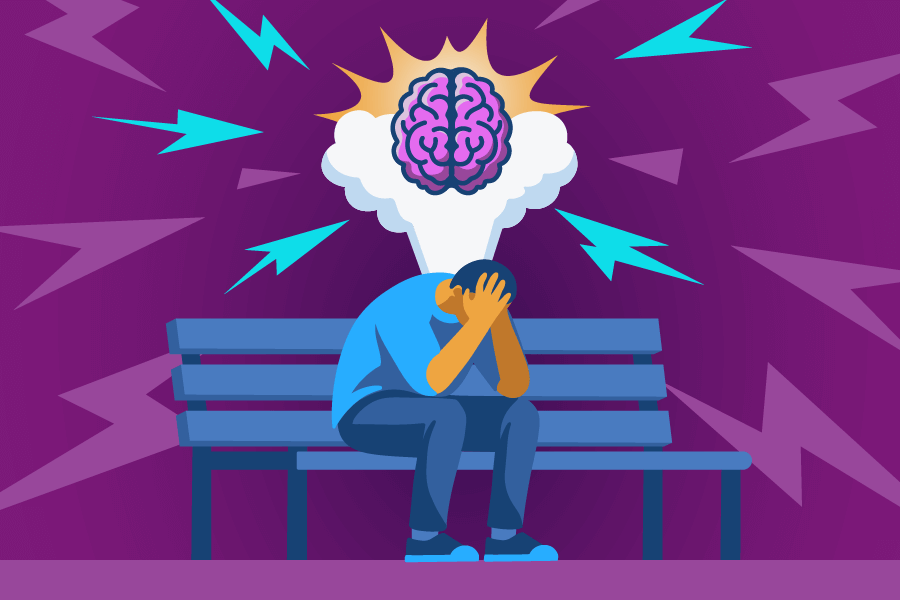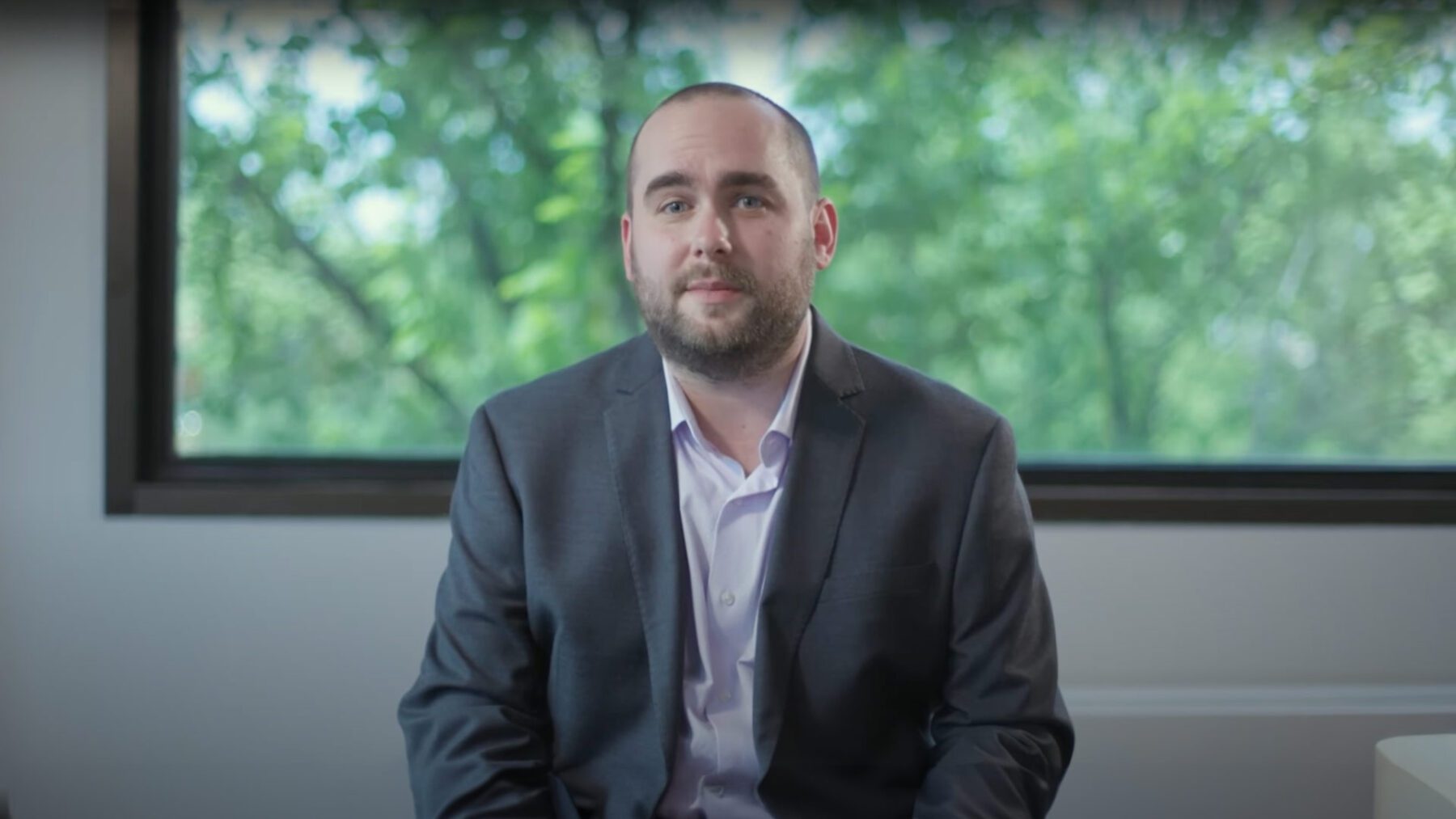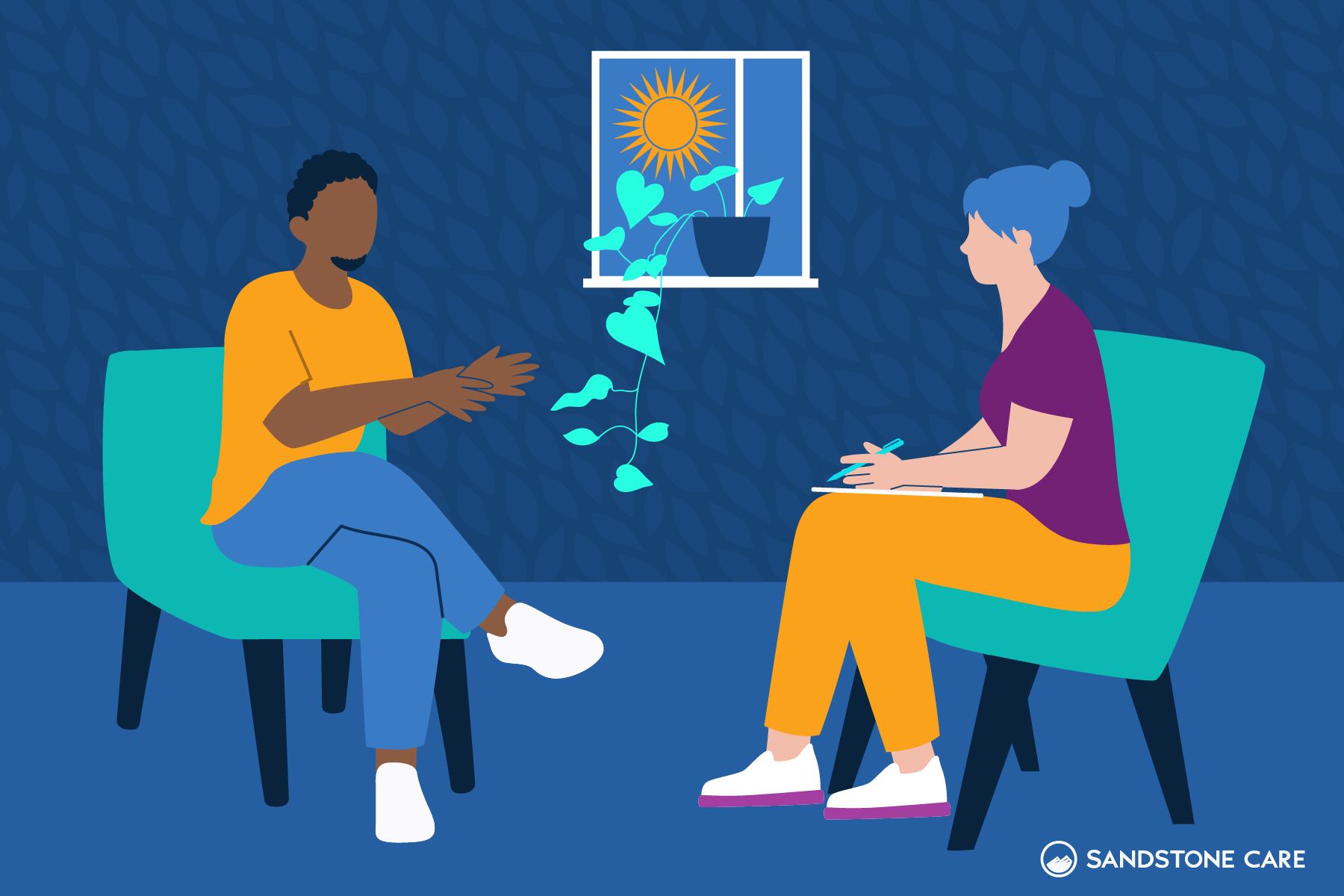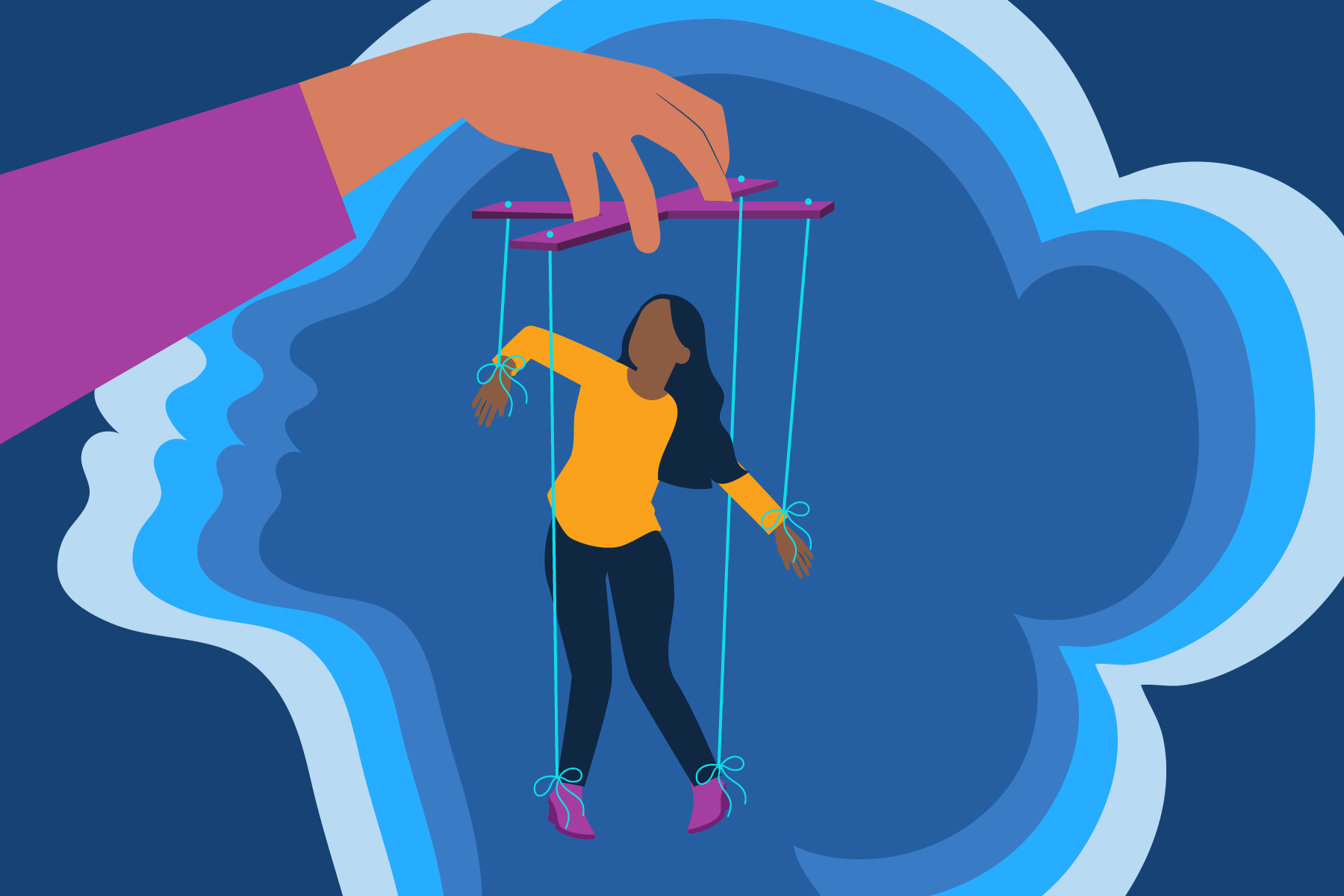Mental Breakdown Overview
What Is a Mental Breakdown?
A mental breakdown happens when someone feels so overwhelmed by stress, anxiety, or depression that they can’t handle their normal daily life.
It is also sometimes called a nervous breakdown.
Mental breakdowns are not a diagnosed medical condition, but they can often be paired with mental health issues like anxiety disorders.
Common signs include panic attacks, extreme mood swings, feeling hopeless, being very tired, and having trouble focusing.
People might also have trouble sleeping or eating, and they might feel physical symptoms like chest pain.
HOW DO YOU KNOW IF YOU’RE SHOWING SIGNS OF A MENTAL BREAKDOWN?
Call (888) 850-1890 to schedule your own personal mental health assessment and find out from the experts.
What Does a Mental Breakdown Look Like?
A mental breakdown may look like:
- Mood swings or emotional outbursts
- Feelings of frustration or anger
- Paranoid thoughts
- Thoughts of self-harm
- Feelings of anxiety, panic, or doubt
Someone having a mental breakdown may also have a hard time making decisions, processing information, or focusing on tasks.
Other symptoms of a nervous breakdown include:
- Pervasive panic or fear
- Periods of intense crying or other indications of a mental health crisis
Talking with a mental health professional about potential mental health issues and how to support a loved one can be a great way to explore treatment options while navigating the immediate effects of a mental breakdown.
What Does a Mental Breakdown Feel Like?
A mental breakdown often feels overwhelming and can bring intense feelings of fear and desperation. Some describe it as feeling “paralyzed” or like something “snapped.”
Panic, helplessness, anxiety, and depression are all common signs of a nervous breakdown.
Someone having a mental breakdown may feel like they are having so much mental distress in their day-to-day life that they cannot take care of themselves or their loved ones.
They might feel that time is moving very quickly or very slowly, or that their mind cannot calm down enough to allow them to get the sleep that they need.
An individual experiencing a nervous breakdown may also see little hope for changing the situation, which can make it difficult for them to make healthy and helpful lifestyle changes.
Because mental breakdowns can make it so difficult to feel motivated, those who experience them often need dedicated professional help like that available at Sandstone Care.
Working with therapists and other mental health professionals can help those struggling to find the right coping skills to deal with feelings of a mental breakdown.
Why Do People Have Mental Breakdowns?
The cause of a mental breakdown can vary from person to person, but often people have mental breakdowns because of chronic stress.
The human body is not meant to be stressed for long periods of time, and that feeling of constant pressure can make it difficult for the brain to process emotions in a healthy way.
People often show signs of burning out at work or school as they inch closer to a mental breakdown.
Some people also have mental breakdowns after they experience a traumatic event, especially if they have underlying mental health conditions, like depression and anxiety.
Usually mental breakdowns are caused by a combination of many different things, such as relationship or career problems, triggering events like car accidents, financial issues, and more.
Mental health professionals can help those experiencing a mental breakdown to narrow down the most important underlying causes to get back on their feet as quickly as possible.
How Long Does a Mental Breakdown Last?
The length of a mental breakdown can vary from person to person but often last from a couple of hours to weeks.
The length of a mental breakdown often depends on how quickly someone gets help. Therapy, medication, and support from friends or family can help reduce how long someone is suffering.
Without help, it may take longer to recover and could lead to a cycle of future breakdowns.
Causes of a Mental Breakdown
There can be a variety of situations and causes associated with a mental breakdown, and many are very personal.
Talking with a mental health professional at Sandstone Care to explore each person’s unique stresses, challenges, symptoms, and underlying mental health issues is important to understand the causes of a mental breakdown.
What Causes a Mental Breakdown?
Some of the most common causes of a mental breakdown include:
- Constantly high levels of stress, such as a toxic work environment or relationship
- Burnout
- Post-traumatic stress disorder (PTSD)
- Other underlying mental health issues or a family history of anxiety, depression, or other challenges that affect everyday life
- Sudden life changes, such as loss of job, financial challenges, breakups in important relationships, and more.
Each of these can be further impacted by additional factors, such as the use of drugs or alcohol.
It’s important to note that no two people will have the exact same cause for their mental breakdown.
Why Do I Have Mental Breakdowns?
You may have mental breakdowns because you are not getting the mental or physical rest that your body needs to process your emotions.
This can happen if you are working too hard or are in an environment that makes you feel guilty for taking time to take care of yourself.
For example, working long hours at a high-pressure job or living with a partner who is emotionally abusive.
You also may experience a nervous breakdown if you have had a traumatic event that uproots your daily life ir sense of self.
For example, experiencing a sudden loss of a loved one or going through a natural disaster can make you feel so overwhelmed that you experience a mental breakdown as a type of “survival mode.”
Can Lack of Sleep Cause Mental Breakdowns?
Yes, a lack of sleep can cause mental breakdowns. Sleep is essential for the brain to recover and process emotions, and when you don’t get enough, your brain becomes overwhelmed.
Without proper rest, your body increases stress hormones like cortisol, which can make you feel anxious or emotionally unstable.
Over time, this constant stress makes it harder for your brain to handle challenges, leading to emotional burnout.
Physically, sleep helps your brain regulate mood and decision-making.
When you’re sleep-deprived, these areas of the brain don’t work as well, making it harder to stay calm or think clearly.
Signs of a Mental Breakdown
Each person will express unique symptoms when they are experiencing a nervous breakdown.
Knowing what to look for in oneself or a loved one can empower each person to take educated and appropriate action to address the situation.
How Do I Know If I’m Having a Breakdown?
You may be having a breakdown if you can’t take care of yourself, your loved ones, or your daily tasks because you feel too overwhelmed or panicked.
Common signs include intense feelings of anxiety or panic, uncontrollable crying, mood swings, or a sense of hopelessness.
You may also feel mentally and physically exhausted, have trouble focusing, or withdraw from social interactions.
Exhibiting the signs of a mental breakdown, alongside a lack of self-care or ability to address these symptoms, can be a sign of a mental breakdown.
However, self-diagnosing a nervous breakdown can be difficult, and calling a local treatment facility like Sandstone Care can be a great way to connect with professionals who may be able to help educate a person further.
What Are the Signs of a Mental Breakdown?
A mental breakdown often shows up in a mix of emotional, physical, and behavioral changes such as crying constantly, trouble sleeping, or lashing out at loved ones.
For example, someone going through a breakdown might feel constant anxiety, like their mind is racing with worries they can’t control.
They might start crying unexpectedly, even during small, everyday tasks like making breakfast, and feel a deep sense of hopelessness, as if nothing will ever improve.
Physically, they may be completely exhausted, struggling to get out of bed or complete simple activities that normally wouldn’t be a problem.
Sleep becomes an issue, too—they might lie awake for hours at night, unable to calm their thoughts, or wake up feeling just as tired as when they went to bed.
Sometimes, their body might react with headaches or even chest pain, which only adds to their stress.
Behaviorally, they might pull away from friends and family, avoiding social interactions that used to bring them comfort.
At work or school, they could find it impossible to focus, making even basic tasks feel overwhelming.
They may also become easily irritated, snapping at loved ones over small things that wouldn’t usually bother them.
All of these signs point to a person who is mentally and physically struggling to cope.
What Is the First Stage of a Mental Breakdown?
The first stage of a mental breakdown typically includes things like losing focus, burning out, or pulling away from friends and loved ones.
For many, a mental breakdown can seem to set in without warning, with the sudden culmination of intense stress resulting in a mental health crisis.
However, there can occasionally be signs of a mental breakdown that loved ones can use to address the situation before it develops further.
Noticing a drop in ability to tend to responsibilities, reluctance to go to social events, an increase in the use of drugs or alcohol, or the onset of pessimistic or self-derogatory language can all indicate that a person’s levels of stress are becoming difficult to manage.

Is this blog hitting close to home?
We’re here to help.
The Symptoms of a Mental Breakdown
What Are the Symptoms of a Mental Breakdown?
Symptoms of a mental breakdown include:
- Increased levels of anxiety
- Depression
- Feelings of helplessness
- Overwhelming, persistent, and intense stress or fear
- Difficulty making decisions or focusing on tasks
- Inability to tend to responsibilities, either personal or professional
- Irritability
- Decreased resilience to stress
- Panic attacks
- Difficulty forming new memories
- Paranoia
Mental breakdowns can also have many physical effects on the body, from feelings of fatigue and exhaustion to muscle pains, nausea, or gastrointestinal complications.
Compromised self-care and sleep routines are very common.
It is also common to see other self-destructive practices such as the use of drugs or alcohol.
An individual may also compromise hygiene routines or skip meals due to these effects.
What Happens to The Brain During a Mental Breakdown?
During a mental breakdown the brain moves into a “fight or flight” mode since it is struggling to process sustained, intense stress.
Stress can signal to the body that there must be danger nearby, speeding up the heartrate and causing a variety of other physical effects in an attempt to protect the person who is suffering.
However, the brain is not built to stay in this hypervigilant state for long periods, and those experiencing a mental breakdown may be in this mode for days or weeks.
Persistent stress can also affect a person’s ability to focus or form new memories while also affecting the brain’s structure and impacting memory, decision-making, and more.
What Happens to Your Mind During a Mental Breakdown?
A person’s mind can be fundamentally affected by a mental breakdown and the associated intense stress, and it can fundamentally affect a person’s perception and emotional health.
Those experiencing a mental breakdown may begin to see the world through a more pessimistic view, forming feelings of helplessness that can be difficult to overcome.
These feelings can also inform other risk factors and stress, compromising self-care and even informing suicidal thoughts that demand dedicated professional help to overcome.
DON’T WAIT UNTIL YOU ARE BURNED OUT TO START GETTING HELP
Call (888) 850-1890 to schedule your own personal mental health assessment and get support from the experts.
What Does a Mental Breakdown Do to Your Body?
Some physical symptoms of mental breakdowns include:
- Nausea
- Vomiting
- Muscle aches
- Fatigue
- Insomnia
- Headaches
- Unexplained pains
- Loss of appetite
Is Crying Part of a Mental Breakdown?
Yes, crying can be a common symptom of a mental breakdown, with excessive crying being a sign of intense and unprocessed stress, anxiety, depression, and more.
How to Deal With a Mental Breakdown
Seeking professional treatment from healthcare professionals is paramount to navigating a mental breakdown and preventing future breakdowns from impacting daily life.
Professional help, along with an educated support system for loved ones, can all help deal with the effects of a mental breakdown.
What Do You Do When Someone Is Having a Mental Breakdown?
These situations can be delicate. However, loved ones, friends, and family members can still be important in navigating these challenges. Some ways to help include:
- Being present and actively listening
- Creating a supportive and encouraging atmosphere that does not stigmatize mental health needs, stress, or other challenges
- Research potential relaxation techniques and self-care and offer to engage alongside a loved one.
- Explore local treatment facilities and educate oneself on their programs
Who Do You Call If Someone Is Having a Mental Breakdown?
Contacting support, family members, and loved ones is essential when recognizing the symptoms of a nervous breakdown to ensure that their support system is ready to act.
Contacting local treatment facilities like Sandstone Care can provide further information on potential treatment options and education to family members on how to navigate these challenging and fragile situations.
Treatment for a Mental Breakdown
While mental breakdowns can feel overwhelming, there is always treatment available.
Talking to dedicated professionals like those at Sandstone Care can help each person explore the treatment options best available for each person.
How to Avoid Mental Breakdowns
The best approach to navigating a mental breakdown is to try to prevent it in the first place, with dedicated healing and self-care being necessary to prevent mental breakdowns.
Self-care, education, healthy eating, hobbies, hygiene routines, and consistent sleep schedules are all great ways to prevent a mental breakdown.
Journaling or other mindfulness practices can also help each person recognize their feelings and when changes due to stress may be manifesting, encouraging an individual to engage in more self-care or to take time to process stress.
Regular communication with family members, loved ones, or peers in support groups can promote a healthy approach to mental and physical wellness that can help prevent mental breakdowns by proactively addressing stresses and identifying stressors as early as possible.
What Do Doctors Do for a Mental Breakdown?
Doctors can help address the immediate symptoms of a mental breakdown, typically through prescribing antidepressants or anti-anxiety medication, depending on the situation.
However, while medication can help address specific symptoms and promote healthier sleep and a return to stable emotional homeostasis, no medication can replace other forms of treatment.
Cognitive-behavioral therapy, talk therapy, peer support groups, breathing exercises, and other forms of psychotherapy are all important in helping to navigate stresses and prevent mental breakdowns in the future.
Likewise, working with a mental health professional is necessary to explore a potential mental health diagnosis, such as PTSD, major depressive disorder, anxiety, bipolar disorder, and more, that may affect the chances of a mental breakdown.
How Long Does It Take to Recover From a Mental Breakdown?
Mental breakdowns do not have a definite timeframe, and each person will recover at their own pace.
Access to professional help, at-home support from loved ones and support groups, removing oneself from stressful situations, and working with professionals to identify stressors, underlying mental health conditions, and other risk factors can all further affect the time necessary for truly effective and transformative healing.








